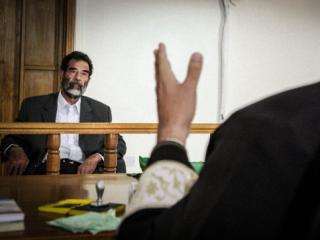First it was vinyl; now, it's the typewriter. Vintage Smith-Coronas and Olivettis are hot items on Ebay and making a comeback in the age of computers. Philosopher Richard Polt assesses the typewriter revolution.More
Politics and History
A conversation with renowned biologist Jared Diamond, best known for his Pulitzer Prize-winning book “Guns, Germs and Steel.” His new book is “The World Until Yesterday: What Can We Learn from Traditional Societies?”More
David Morris spent three years reporting in Iraq before an improvised explosive device forced him to return home. The attack haunted him, and kicked off a bout with PTSD that would take years to recover from. More
Generation Z is arguably shaping up to be one of the most activist generations in recent memory. Teenager Tyler Ruzich ran in 2018 for governor of Kansas, as a Republican "for a new generation."More
As we hear out the ambitions of today's teen activists, politicians and artists, what do they think adults need to do to help them change the world?More
Have you ever tried to lobby a US Senator? How about when you were 17? Angie Jiang did. She’s a high school senior. She’s on the swim team. She loves Beyonce. And she’s an advisor to the UN.More
In 2017, a new museum of fascism was proposed in Predappio, Italy—the birthplace of Benito Mussolini. Historically, the town was already a pilgrimage site for neo-Fascist groups. Journalist Ilaria Maria Sala explains the town’s history with fascism and how they’re trying to reckon with it today.More
For three decades, MIT professor Sherry Turkle's been looking at the ways we interact with machines. She believes our digital devices are taking a toll on our personal relationships.More
The personal devices we live with and depend on — our computers, tablets, smartphones and more— all share information about us. Randolph Lewis tells more stories about how we’re being watched in a book called “Under Surveillance.”More
The young American soldiers who protected Saddam Hussein during his trial spent hours alone with the “Butcher of Baghdad” and unexpectedly grew to like him. They were devastated by his execution and its violent aftermath. More
TTBOOK producer Doug Gordon wonders if he's surrounded by a**holes.More
There's no shortage of forecasts about the future these days. But did you know that ordinary people can out-predict the pros? More
Have we lost sight of ancient virtues like courage, compassion and truth? Mark Edmundson thinks we have, and he says we'd do well to read Homer, Plato and the ancient sages.More
Carlos Fraenkel wanted to take philosophy out into the streets, so he met with students at Palestinian and Egyptian universities, and found that Plato, Maimonides and other great philosophers can open up a culture of conversation and debate.More
Psychologist Robert Enright breaks down cognitive steps to letting go of trauma.More
When Jane Willenbring was a young scientist working in Antarctica, she was the target of constant hazing by her team leader. Years later, she filed a complaint. David Marchant was recently found guilty of sexual harassment by Boston University.More
In 1985, The New Yorker writer Susan Orlean started traveling around the country to find out how Americans spend their Saturday nights. One thing she discovered? How many Saturday night songs there are.
More
People in every century, every age have complained about feeling exhausted. What’s changed over time are the explanations. Cultural historian Anna Katharina Schaffner lays them out in her new history of exhaustion, "Exhaustion: A History."More


















